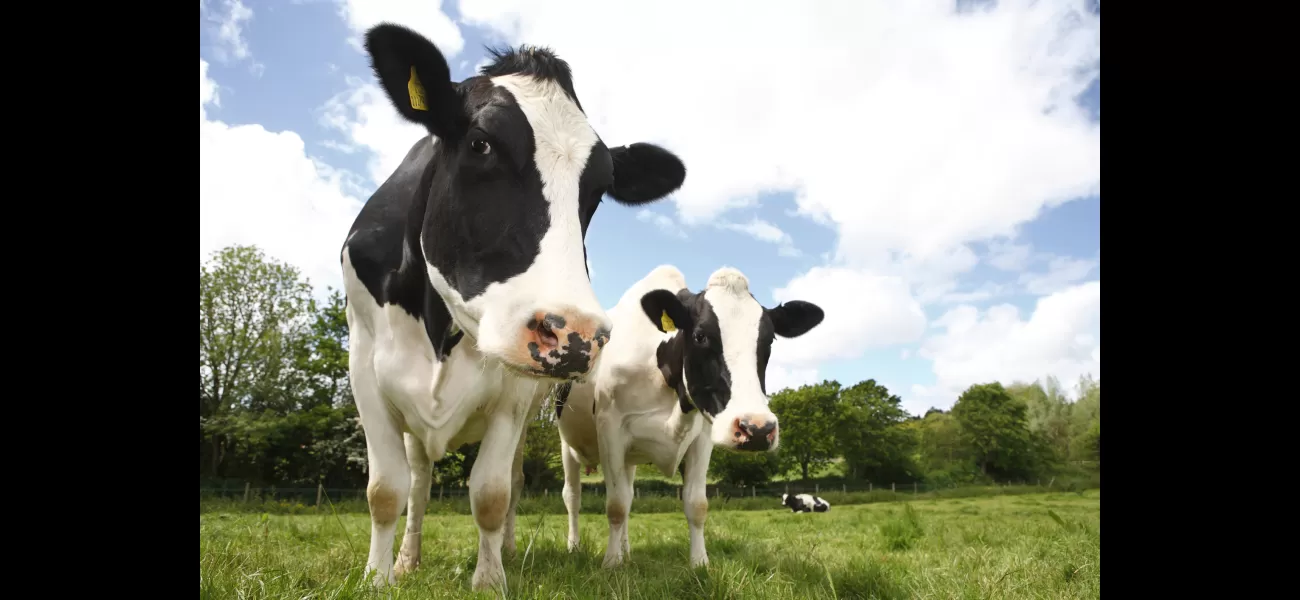A new strain of Bluetongue disease poses a threat to the UK, prompting a warning.
It may result in death.
May 7th 2024.

A concerning virus has been making its way through farms and livestock in the UK. Experts are warning of a new strain of the bluetongue virus, which is carried by midges that have been blown over from Europe. This disease has been causing great devastation to farm animals, adding to the already challenging year for farmers who have been struggling with heavy rainfall.
According to government officials, there is a high likelihood that this virus will continue to spread, as there have already been 126 cases reported in cattle and sheep in England. It is important to note that this virus does not affect humans and does not pose a risk to food safety. However, it can be fatal for farm animals, with a mortality rate of 30% in sheep and a decrease in milk production in cattle. The symptoms include ulcers in the mouth, tongue, or nose, difficulty swallowing, fever, and lameness, all of which greatly impact the well-being of the animals.
This virus is known as bluetongue because it can cause a lack of oxygen to the tongue, which turns it blue. It can affect various animals, including sheep, cattle, deer, goats, llamas, and alpacas. Currently, there is no approved vaccine for the new strain, BTV-3, in the UK. The Netherlands has recently given emergency approval for a vaccine in hopes of combatting the virus, which has already infected over 6,000 animals.
The Department for Environment, Food and Rural Affairs has stated that any vaccine used in the UK must go through the proper market authorization process before it can be made available. Bluetongue is considered a notifiable disease, meaning that any farm that becomes infected must report it to Defra. This virus has a 30% fatality rate in sheep, causing great concern for farmers like Roger Dunn from Kent, who was forced to cull six of his cattle to prevent the spread of the virus to the rest of his herd and his sheep.
Dunn shared his worries about the impact on his business, stating that he could potentially lose 30-40% of his bloodlines and even his entire herd if the outbreak becomes severe. He also expressed the difficulties of movement restrictions and the overall nightmare this virus has caused for farmers. Bluetongue is primarily spread by midges, small biting insects that carry the virus. When a midge bites an infected animal, it ingests the virus and can then spread it to other animals.
In response to outbreaks, disease control zones can be put in place to restrict the movement of animals from the affected area. While Mr. Dunn's farm is not currently in a control zone, he mentioned that some buyers are hesitant to purchase stock from him. This virus also affects alpacas, adding to the concerns of livestock owners. David Barton, chair of the National Farmers Union, expressed the anxieties of farmers and raised questions about the new vaccine, such as its cost, rollout, and government support for efficient deployment.
According to government officials, there is a high likelihood that this virus will continue to spread, as there have already been 126 cases reported in cattle and sheep in England. It is important to note that this virus does not affect humans and does not pose a risk to food safety. However, it can be fatal for farm animals, with a mortality rate of 30% in sheep and a decrease in milk production in cattle. The symptoms include ulcers in the mouth, tongue, or nose, difficulty swallowing, fever, and lameness, all of which greatly impact the well-being of the animals.
This virus is known as bluetongue because it can cause a lack of oxygen to the tongue, which turns it blue. It can affect various animals, including sheep, cattle, deer, goats, llamas, and alpacas. Currently, there is no approved vaccine for the new strain, BTV-3, in the UK. The Netherlands has recently given emergency approval for a vaccine in hopes of combatting the virus, which has already infected over 6,000 animals.
The Department for Environment, Food and Rural Affairs has stated that any vaccine used in the UK must go through the proper market authorization process before it can be made available. Bluetongue is considered a notifiable disease, meaning that any farm that becomes infected must report it to Defra. This virus has a 30% fatality rate in sheep, causing great concern for farmers like Roger Dunn from Kent, who was forced to cull six of his cattle to prevent the spread of the virus to the rest of his herd and his sheep.
Dunn shared his worries about the impact on his business, stating that he could potentially lose 30-40% of his bloodlines and even his entire herd if the outbreak becomes severe. He also expressed the difficulties of movement restrictions and the overall nightmare this virus has caused for farmers. Bluetongue is primarily spread by midges, small biting insects that carry the virus. When a midge bites an infected animal, it ingests the virus and can then spread it to other animals.
In response to outbreaks, disease control zones can be put in place to restrict the movement of animals from the affected area. While Mr. Dunn's farm is not currently in a control zone, he mentioned that some buyers are hesitant to purchase stock from him. This virus also affects alpacas, adding to the concerns of livestock owners. David Barton, chair of the National Farmers Union, expressed the anxieties of farmers and raised questions about the new vaccine, such as its cost, rollout, and government support for efficient deployment.
[This article has been trending online recently and has been generated with AI. Your feed is customized.]
[Generative AI is experimental.]
0
0
Submit Comment





